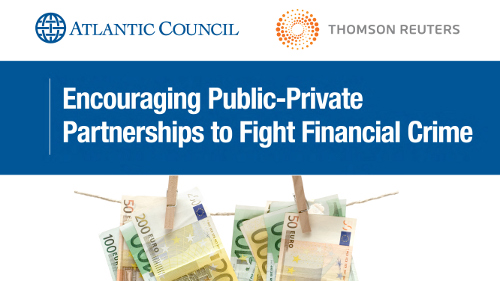More than five years into the global financial crisis, a host of challenges continue to plague the integrity and health of the financial system. High among these is the ongoing fight to prevent criminals—money launderers, terrorist financiers, and organizations and individuals sanctioned by the international community—from utilizing the system. This fight is chiefly directed by governments and requires a set of rules and enforcement tools for the private sector; but the goals of government and financial institutions should align to create a seamless partnership in safeguarding global prosperity and security.
Over the course of 2012, the Atlantic Council and Thomson Reuters convened a series of expert working group sessions that examined how governments and financial institutions can improve their cooperative efforts to prevent financial crime and safeguard the financial system. The project’s goal is to spark debate about the strategic direction of the fight against financial crime, and assess whether current regulations and rules, and the process by which they are made, effectively meet desired policy ends.
The report “Encouraging Public-Private Partnership to Fight Financial Crime,” summarizes these discussions and brings out the major ideas and recommendations of the group.
On October 18, Thomson Reuters and the Atlantic Council released the report and convened a small conference of senior experts to discuss its findings. Our focus was to develop concrete ideas about the best way for government and the private sector to partner in ensuring that the financial system can serve its intended purpose: to generate liquidity for the real economy in a stable and safe manner.
The most important issues highlighted in the report, and emphasized at the conference, include:
- Governments have long relied on private financial institutions to help in the fight against financial crime, and this mission has evolved in the last decade to encompass national security objectives.
- This evolution is sensible to a point, given global events and the use of the financial system by terrorists and rogue regimes; but governments need to better articulate the strategic intent to the private sector.
- There is a growing risk of “mission creep” as governments add more targets, and there is now a distinct threat that increasing compliance costs will corrode proactive engagement and enforcement efforts of financial institutions, turning compliance practices into defensive “box-checking” exercises.
Better partnership is the solution to these problems. Governments and financial institutions need to consult more frequently, more substantively, and with greater candor to lower regulatory costs and improve crime fighting effectiveness. The project has outlined the major issues such a partnership should address, and we are now looking at ways to help facilitate that discussion.
